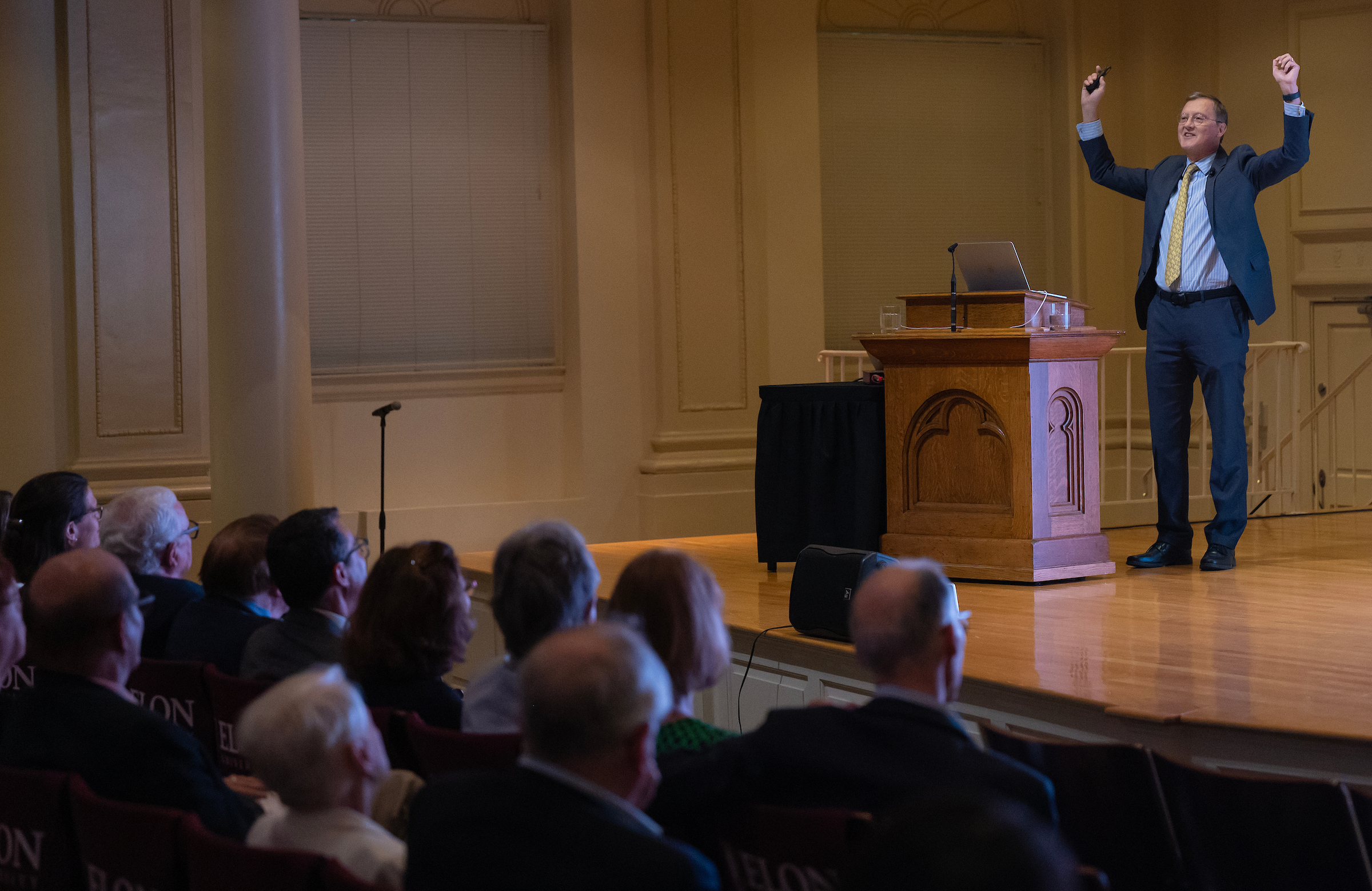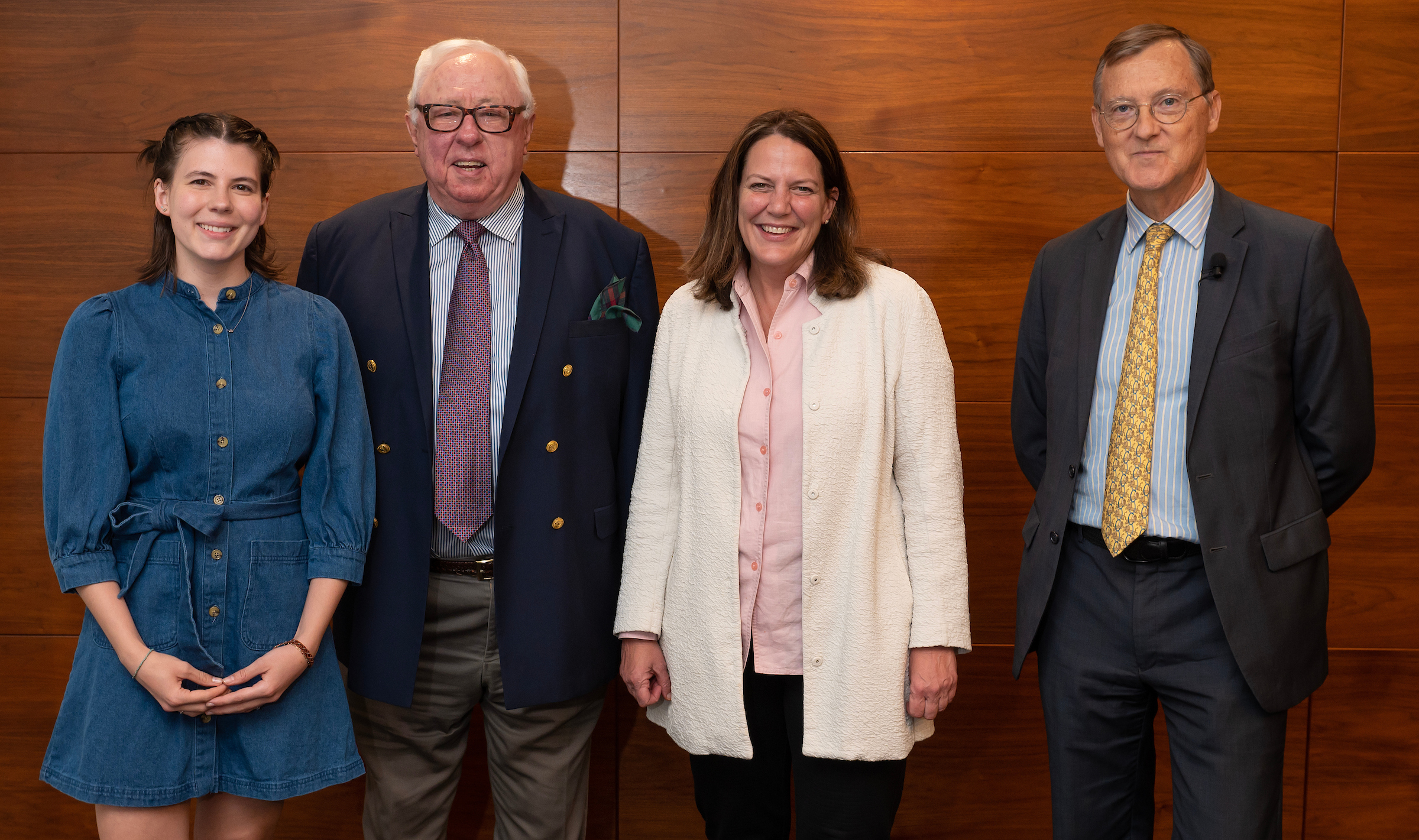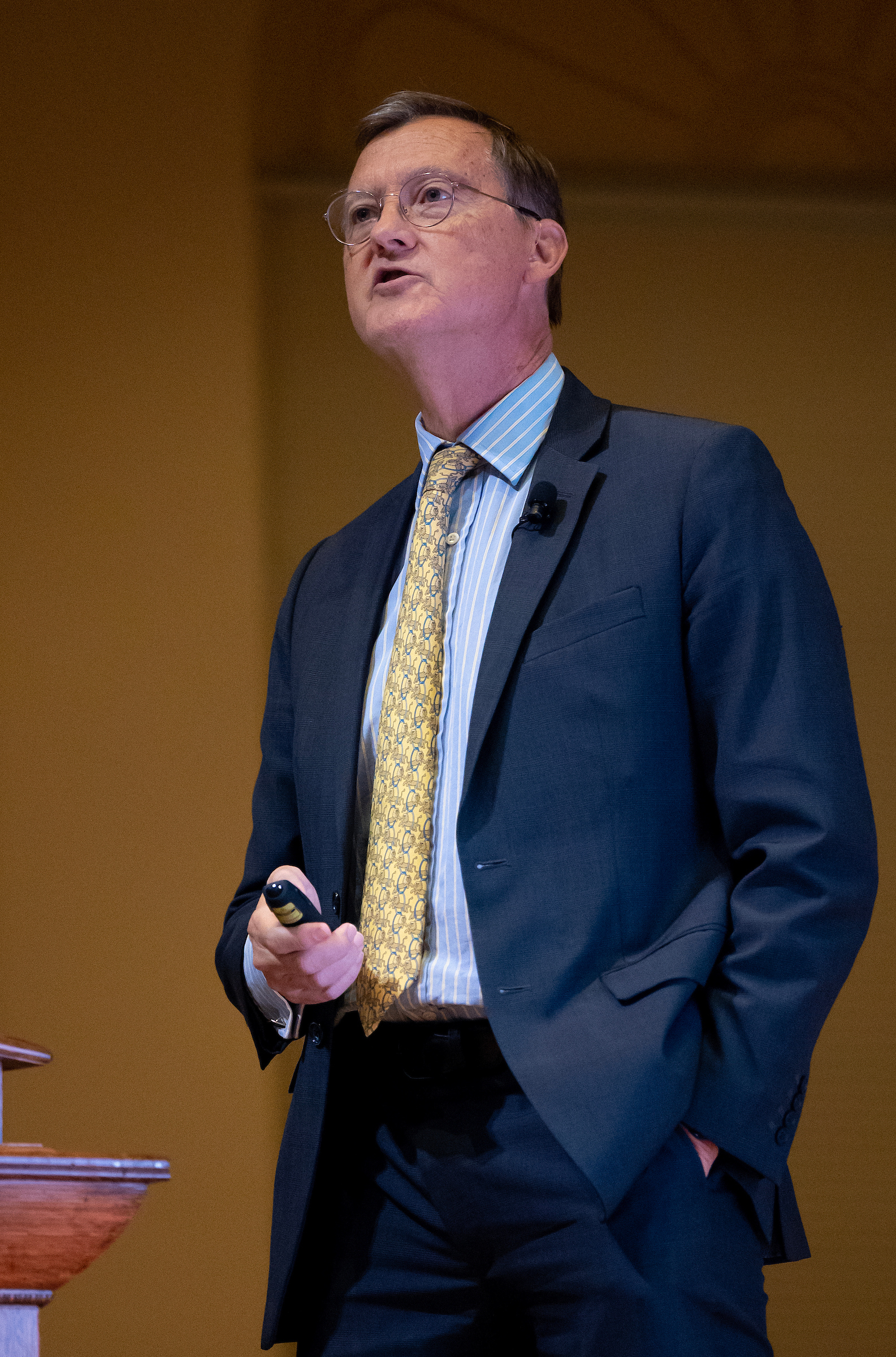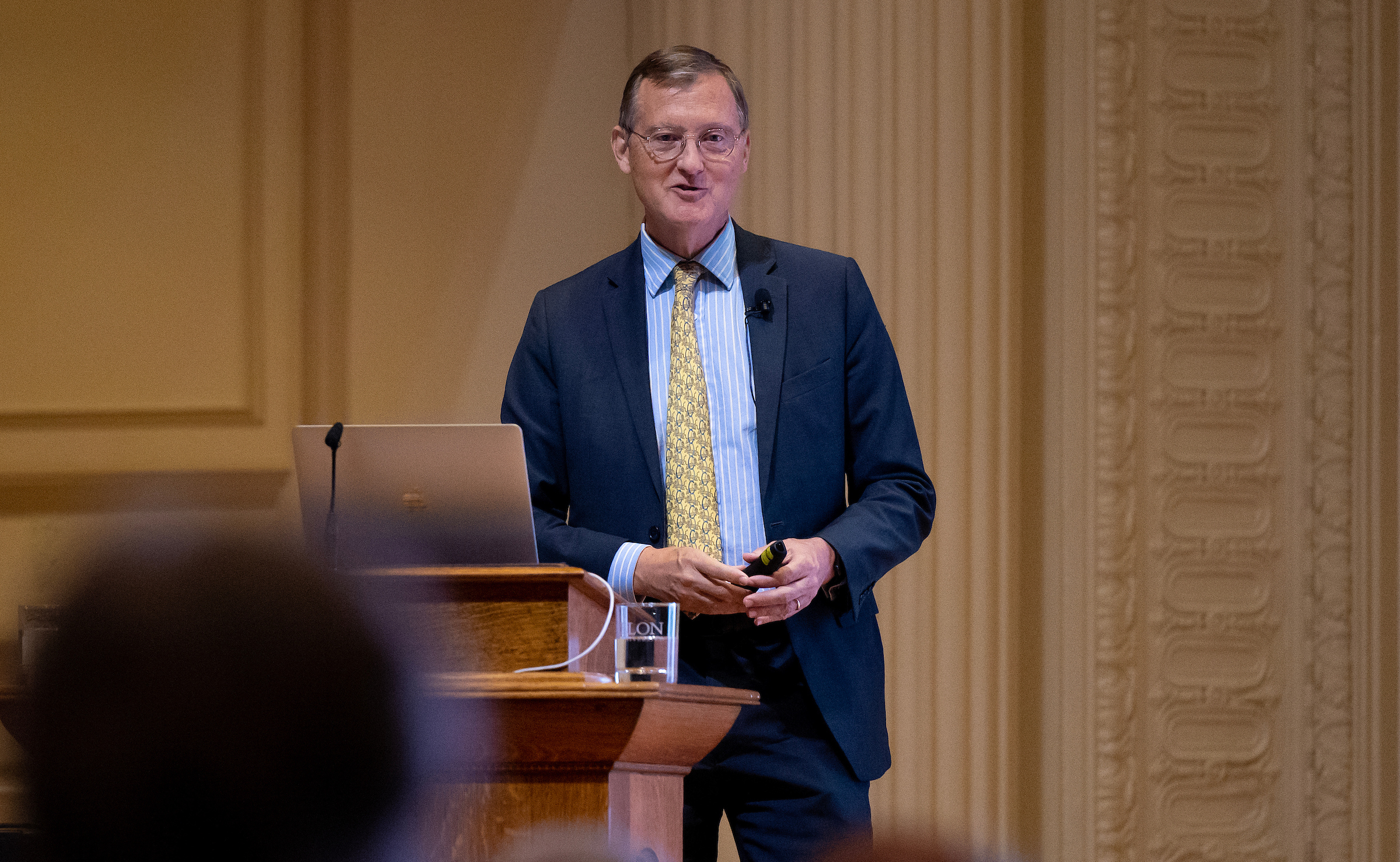The physician and renewable energy entrepreneur recounted his experience across 16 years in rural Rwanda that revived a local hospital and brought electricity to the surrounding community.

Arriving in rural Rwanda with his family in 2003, Dr. Caleb King was a pediatrician who as a Harvard University medical student also obtained his doctorate in civil and environmental engineering from the Massachusetts Institute of Technology.
During the next 16 years working side-by-side, King and his wife, Louise, a fellow physician, would revive a hospital left nearly in ruins by the country’s genocide and help design and build a hydropower system that would bring electricity not just to this vital health care provider, but to the residents in the surrounding community.
But as King explained Thursday night to those gathered in Whitley Auditorium, their energy and expertise alone were not enough to accomplish either of those monumental tasks — it took tapping into the variety of talents, knowledge and insights from multiple people who were passionate about enacting change. It took convergence and collaboration.
That’s a theme that now runs through King’s work as part of The Institute for Convergent Science at the University of North Carolina at Chapel Hill, which seeks to create collaboration across campus and across disciplines that could lead to the development of new technologies and ideas promising broad societal impact.
“Without convergence, without unity, the very strength of our diversity is lost as we drift apart in every direction,” King said. “When we think about how convergence affects us, we need to remember that we all live in one world together. I believe diversity without unity lacks cohesion and shared meaning when we all live in one world with shared problems.”
King visited Elon on Thursday as the featured speaker for the 2023 James P. Elder Lecture, an endowed lecture series devoted to the exploration of critical scholarship and its impact on the public forum. During his talk, he shared about the challenges he and his family faced as they devoted themselves to making an impact in rural Rwanda, and how he is now using those experiences to help foster the creation of new solutions to societal problems.
King recounted that when they arrived in Rwanda, the country was still recovering from the genocide that had left hundreds of thousands of people dead less than a decade earlier. “There was peace, of a sort, but the country wasn’t running on all four cylinders,” King said.
Neither was Shyira Hospital, which sat atop a steep hillside and was barely meeting the medical needs of the surrounding community. The only X-ray machine had been smashed during the genocide and never repaired. There were no beds or mattresses for patients, who mostly lay on the floor. A single nurse was caring for nearly 100 patients, King said.
“We arrived at the top of the hill, and the hospital needed a lot of work,” King said. “The inside was not a lot more promising than the outside.”

At the same time, many who had fled the country during the genocide were just now returning, and those who remained still bore the psychological and often physical scars from the fighting. There was plenty to do to revive the hospital, build resources and position it to remain sustainable and staffed over the long term.
“We were young and we thought we were up to it,” King said of himself and his wife, as well as their four children ages 7, 5, 3 and 5 months.
Over time, the hospital took shape, thanks largely to King working to connect with people locally who could help meet the broad medical needs he himself, as a pediatric gastroenterologist, was not trained to address. The completion of a new maternity ward in 2003 — thanks to the work of a broad range of stakeholders from different areas — would prove key to the long-term success of the hospital.
A celebration of the new ward’s opening attracted the attention of the country’s prime minister, who was so impressed by the effort that he dedicated new resources to building the hospital’s staff, purchasing an ambulance, bringing satellite Internet to the area and directing funding for a new HIV program. “The HIV program was transformative, and so many people are alive today because of that,” King said.
But the hospital remained limited due to the lack of sustained, reliable electricity. Solar power helped meet some needs in the hospital’s labs but was not enough to power the hospital as a whole. A diesel generator was available to provide power for short periods of time, but a gallon of fuel cost $8 at a time when a day’s pay for a laborer was 50 cents.
King secured a meeting with the director of the national utility, who told him that it was too expensive to run a line to supply the community with power. However, the director told King that if King was able to harness the area’s rivers and streams for hydropower, the national utility could run a line to the area and purchase the surplus electricity. That’s when King tapped into the knowledge he gained pursuing his engineering doctorate, with research that focused on river basin planning.
“Even though I didn’t really know how to build anything, I thought people would believe me when I was trying to raise money for the project that I knew enough to make this work,” King said.
The system that was designed would divert water along the hillside in a channel that would drop about three meters every 100 meters. After a certain distance, the water was then funneled directly down the steep hillside, which created enough flow and pressure to fuel the hydropower generator. “Most everything in the project was done locally,” King said. “You could see a lot of shiny new roofs because the workers doing the work used that cash to put new roofs on their houses.”
The project drew support from organizations around the country and relied on the talents and skills of those locally to design, build and operate the hydropower system. “The work took lots of different people doing lots of different things,” King said. “There weren’t many people around who could simply say, ‘Yes, I know what to do.’ But together, we were able to do it,” King said.
That’s an approach King brought back to the United States when he returned to Chapel Hill, North Carolina, where he had grown up, after his father died in 2019. Through his work with The Institute for Convergent Science, he and others are bringing together different disciplines to tackle big problems, like how to prepare for the next pandemic, how to meet the challenges of an aging population and how to address access to health care, to name a few.

“These questions require collaborations of scholars and researchers from different fields,” King said. “We must believe that there is hope and deal with new problems as they arise. On our own, we may achieve less than we imagined, but together, we may achieve even more than what we’re asked to do.”
The annual lecture is named in honor of James P. Elder, who served on the history faculty of Elon from 1963 to 1973 and served as an advisor to the Liberal Arts Forum, which he founded as an undergraduate. Thirty years after he left Elon for the Folger Library in Washington, D.C., a group of Forum alumni established an endowed lectureship in Elder’s honor. More than 150 former students and friends have contributed to the Elder Lectureship in tribute to Elder’s example of faculty-student engagement.



